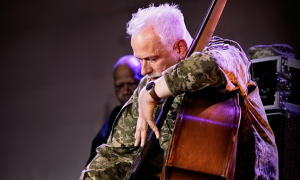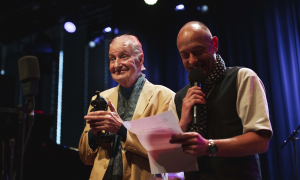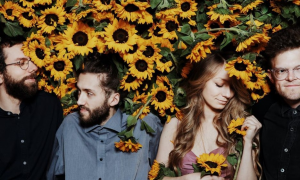Home » Jazz Articles » Profile » Marina Albero: Musical Nomad
Marina Albero: Musical Nomad

Courtesy Jim Levitt
You need to go observe, be discreet, be humble. ThatЎҜs a beautiful exercise, as a musician and as a person.
—Marina Albero

Ray Charles
piano and vocals1930 - 2004

Quincy Jones
arranger1933 - 2024

Marina Albero
pianob.1979
Albero had a Seattle connection in hand, having spent time there in 1992 as a twelve-year-old. Her father, iconic Catalan musician / composer Marian Albero, was visiting to rehearse for a play to be presented at the Summer Olympic Games being held in Barcelona later that summer. The play was produced by Seattle-based One Reel and directed by Linda Hartzell, director of Seattle Children's Theatre. During her time here, the then twelve-year-old Marina was introduced to the hammered dulcimer, an instrument she could dive into unimpeded by studies and the instructions of adults. It allowed her to use her imagination to create melodies and rhythmic impulses. It was the beginning of her interest in, and natural talent for, the art of improvisation. She too became enamored with the breathtaking natural beauty of the Pacific Northwest, and the friendly, welcoming spirit of its people. As well, her father knew, even then, that the world would hear his daughter's music.
Albero arrived with two children just on the edge of their formative years. She felt strongly that Seattle would provide a better environment for the children than a larger city like New York could provide. Her initial goals were simple and forthright. "I came to America with a whole musical point and goal which was learning and playing American music with American musicians," she says, plainly and succinctly.
Tasked with the everyday responsibilities of parenthood, she would try to establish herself as a local musician. She would do just that, and quicker than one might have imagined. That creative burst would as well identify her as a unique, highly creative, serious international presence that defied category, but fit comfortably in the jazz community. It was fellowship within that community that opened her mind and technique by allowing her to improvise, and play how she wanted.
By that time. Albero had well established herself as a performing musician, and had released the independently produced triple album A Life Soundtrack (Self-Produced, 2019). Her musical style was a true reflection of her life in music, the recording containing newly recorded tracks with Seattle musicians, as well as a 2008 studio session in Spain with friends and family members—highly skilled musicians all. Seattle was an entry portal into jazz and the blues, an additive to her life in folk, classical and flamenco forms, accelerated by the musical give and take of her life that had colored her creative persona with a myriad of forms.
Albero's musical evolution has seemingly taken place in phases of opportunity that arose over the natural course of her life. Her childhood spent with a musical family was the beginning of her journey. At the time. Spain was transitioning from the Franco dictatorship to democracy. Catalan artists were not permitted to perform in their native language under Franco's decades-long regime. The Albero family took to performing in the streets to bring the language and Catalan music and performance back to the people. She gained not only musical experience, but learned the responsibilities of activism and pride in her native culture.
At fifteen, she journeyed to Cuba with family members to study classical piano under the direction of master teacher Teresita Junco. She would become close friends with classical and improvising pianist " data-original-title="" title="">Aldo Lopez-Gavilan, Junco's son. The infectious rhythms and musical properties of the island were revealed to her not by playing piano, but by going out dancing with friends to the rich tapestry of sounds in La Habana.
Upon returning to Spain, her piano studies, which now wandered well beyond the boundaries of her training as a classical player, led her to flamenco inflections that arrived from the south of Spain and jazz harmonizations and improvisations penetrating her ever-evolving, original piano style.
Her aforementioned journey to the United States by way of Seattle was next, and Albero was keen to dive deeply into American jazz and blues the only way she knew how—by getting out and playing with American jazz musicians. The Seattle scene was fertile, and soon she was performing at the Ballard Jazz Festival, and the city's top jazz club, Tula's. Her bandmates included " data-original-title="" title="">DЎҜVonne Lewis,

Chuck Deardorf
bassb.1954

Ben Thomas
bassb.1967
Jeff Busch
percussion "
data-original-title="" title="">Evan Flory-Barnes,
"
data-original-title="" title="">Evan Flory-Barnes, 
Jeff Johnson
bassb.1954

Hans Teuber
saxophoneThose well acquainted with Albero's profound virtuosity, and more importantly, her overall sound began to hear the subtle changes in her playing, offering hints of the music that surrounded her in Seattle. She began performing within different musical configurations, sporting a trio one night and a larger band the next. Her solo work was immaculate as well.
Many of her works were arranged into large ensemble pieces. She was named resident artist for the 2021 Earshot Jazz Festival in Seattle, selling out four concerts performed in different formats. Her musical endeavors were adventurous to say the least, pitting her unique skill set up against supremely challenging circumstances. Her multicultural, multi-dimensional performance partnered with Indian and now

Shakti
band / ensemble / orchestrab.1974

Ganesh Rajagopalan
violinNine years into her sojourn in Seattle, in April of 2023, Albero's children had both chosen paths of study that led them back to Barcelona. Her daughter Serena had developed into a vocalist of stunning resonance; her son Marcel an intuitive and dedicated student of sound engineering. Her son's leaving, as any parent, in particular a single parent would know, triggered an impulse within her that represented freedom, an ability to take steps for herself after so many years of her children's concerns being first and foremost. "I realized for the first time in my forty odd years of life, I could do whatever I wanted without affecting anybody else in my family. It's a beautiful feeling, especially when you still feel strong, full of energy and ideas," she says. Her newfound freedom in hand, Albero drifted back to her original ethos upon arriving here from Spain of playing American music with American musicians. That goal had become part of her everyday life in every way, whether performing or teaching privately or at the prestigious Cornish College of the Arts. But she had a desire to explore and dig deep into the Black American music tradition by taking residencies, not visitations, to key locations of the music's evolution.
It is commonly believed that American artists are constantly endeavoring to define what it means to be an American artist, what indeed it means to simply be American. This is a process that has been renewed time and time again. In jazz, that means wading through a history that has positioned the music as the only truly original American art form. Its identity is rooted in Black struggle, and shared on a worldwide scale. It has been reimagined, expressing the here and now of whatever culture embraces it. But no matter who interprets the music, or where that interpretation occurs, it is Black music rooted in the blues, embellished by swing and reflective of the Black experience in the Americas. That truth has a home, and that home lies in the river delta of the mighty Mississippi. It all runs downhill to the city of New Orleans. Albero had a fascination with that rooted tradition and wanted to live it, breathe it, allow it to cohabitate with all she had taken forward from her remarkable life in music. She decided to pay a visit to the Crescent City and to Los Angeles as well to see if either would be a comfortable and fruitful place to call home in the winter months. "New Orleans had always been in the back of my mind. I have my musical places I want to go—New Orleans, Brazil, West Africa and India," she acknowledges.
She learned much from her two trips. Essentially she saw Los Angeles as too spread out to her liking, and very industry oriented. New Orleans on the other hand, she saw as very welcoming, added to her longtime desire to take residency there. She was easily able to meet other musicians and sit in, to feel the vibrancy of the current music scene there. "Once they learn you are a musician, they invite you to sit in. It's very welcoming, very open, and very easy to find the venues. In Los Angeles, it was more of an industry vibe. Things happen more by connections in closed spaces like studios and offices, not public spaces," she observes.
Her trial runs pointed her directly south to New Orleans for a four-month residency beginning in January of 2024. She left her home and most of her things in Seattle, and arrived with very few possessions, without income aside from a few Zoom students, and without knowing any musicians in the city except for multi-reedist

Rex Gregory
saxophoneAlbero adjusted to her new environment, and more importantly, her new lifestyle during this self-imposed residency. She didn't have a car, and spent days biking around the city, getting a basic feel for the vibe of the town. It was like starting all over again, as she had experienced so many times before, most recently in Seattle. She spent many days at home alone, writing, utilizing the minimal gear she had access to. Her baby grand piano at home was replaced by an older, plastic keyboard. While this new adventure would bring joy, create new friendships and provide a rewarding experience musically, it was serious business. Suddenly, she had time on her hands, aside from a few Zoom students, she had all day alone with her music. She wasn't in New Orleans to party, as many new arrivals are. "I had no car, no home, no gear, I was nobody," she says. "It was between scary and inspiring, and some days I thought I was crazy. Nobody was expecting anything, it was all about me and my goals. I had many days of staying home alone, writing. During Mardi Gras, I barely went out. I wasn't there for the party, I was there for the music," she states strongly. Over the course of the weeks and months ahead, Albero met and played with a variety of NOLA musicians, perhaps none as impactful as Cuban artist
YUSA
vocalsGoing into her recording sessions, she would only perform with two musicians with whom she was familiar. Saxophonist Gregory hails from Houston, but attended college in New Orleans and has lived there since, save his brief residence in Seattle that was cut short by the pandemic. Vocalist Serena, her daughter, brought her comfort both musically and emotionally. Her mother Laura Tapias, a highly regarded artist in Catalan music and theater paid her a visit as well. But Albero was destined to create a recording without overdubs, in a space without isolation, performing mostly new music with a group of musicians she had largely met in the clubs and on the streets of the Crescent City. It was a classic risk and reward process. Still, Albero managed to find a group of players that not only fit into her personal vision, but a group who sought to integrate themselves within it.
Bassist/composer
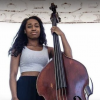
Amina Scott
bass
Dee Dee Bridgewater
vocalsb.1950
Pedro Segundo
percussionBori Albero
bass, acousticShe decided to record six tracks, three previously unreleased, two written in New Orleans and one she had recorded before One of her unreleased tunes, "Blau Blueset," meaning Blue seven in Catalan, is a suite that begins with a slow procession and proceeds with a second line in 7/4. She had performed a big band arrangement of it as resident artist at Seattle's Earshot Jazz Festival, but had never recorded it in studio. The heart of the tune has always seemed to Albero to belong to New Orleans. "It always felt like a New Orleans vibe, even though I had never been there," she reminisces.
Her recording session that would culminate at The Ellis Marsalis Center would be the final chapter of not only her musical quest in the city, but her gathering of the spirit of New Orleans that could only be accessed by living there in everyday life during a time of year that wasn't prone to tourism. It wasn't always easy.
If her writing was to bear the mark of New Orleans and for that matter, the long lineage of the blues and jazz music, Albero would have to experience the ups and downs of life in the deep delta south. There were startling differences culturally, socially and meteorologically from her residence over the past ten years in the maritime northwest. The city will tell you in no uncertain terms whether it's time to stay or if it's time to leave. "The city is hard, and she lets you know. She asks, 'Are you ready for this?' The city is challenging and there's all this energy. You need to be very respectful," says Albero. "It's a rough city because of the weather, the climate and the bugs. It's a very poor state. It's a very hard spot. But New Orleans has this magic and they keep it somehow. A lot of musicians move there because of this, and it creates a real vibrancy."
It wasn't just the history, or some sense of responsibility to maintain the traditions embedded in the city's culture. It was in the everyday, individual actions, the tao of the everyday that somehow seemed to allow the magic to continue. "There is something magical in that city. They take life one day at a time. How they celebrate, how they eat, the importance of family, these things have not gone away," says Albero, already looking forward to her return from Seattle after the sweltering heat of summer subsides. "For me, it has been like an experience that reminded me of something between La Habana and New York," she observes, leaning on the memories of her nomadic journey through music over the course of her life.
Albero envisioned two days of session work, recording in two different quintets and a brass band treatment of one tune, "Blau Blueset." She had fallen in love with the sound of brass bands while biking around the city, observing the sights and sounds of her new residence. "I fell in love with the brass bands from seeing them daily on the streets. I love dancing and they have that kind of groove. The second line is amazing," she says. She would first assemble the brass band at Marigny Studios, and then reconvene at The Ellis Marsalis Center to record the rest, utilizing the center's unique in-house system. Albero would record playing Mr. Marsalis' actual instrument, his piano. Both sessions would be conducted by engineer Armstrong, Albero's Seattle connection who is chief engineer at the center.
Albero decided to title the project, "A Nomad of Sound," an apt description of her musical character, of her life in music. A Life Soundtrack, her first album was a three-CD set with three titles subdividing her creative phases. The 2008 session with family in Spain was titled "Albero." Part two was a new Seattle spontaneously improvised session entitled "Agua," with the transformative third section ending the two-hour and twenty-minute epic dubbed, "Music is Love." The new album bearing the title A Nomad of Sound is, in essence, "A Life Soundtrack, Volume Four." Simply put, Albero sees her recorded works as a soundtrack to her life's journey in music.
To this date, Albero continues to push the project forward, having revealed only tiny parts of the recording during her effort to raise money to pay for her efforts, to this point personally financed. The pianist has a very sound following that tends to support her creative efforts. The exhausting process is familiar to the majority of recording artists in current times, with label support dwindling and artists being left to raise funds on their own via crowdfunding sites. While that process continues for Albero, we are left to wonder what the sum of the effort will sound like. It represents the Barcelona-born, world-traveling artist jumping in line to gather all she has experienced as a Catalan artist on a world quest to spread love through music. To visualize it as a second line, slowly winding towards a destination of discovery, from the beginnings of the sound of the Americas, to current times where it is preserved, cherished, and continues to evolve and spread its influence on an international scale. Like a nomad of sound, Albero energetically is a hunter and gatherer, only to be gathered in loving embrace by her continually growing legion of fans. Her four-month stay in New Orleans perhaps verified what she has always suspected, what all European musicians in search of American jazz know and continue to discover in new and unique ways.
"In Europe, we know that the music comes from Africa. The heartbeat is there. It started in America from scratch again, in a way. The rhythms are from Africa and Spain, but might be better preserved in Cuba and the Americas. It's here in New Orleans, where American music starts."
Tags
What is Jazz?
Marina Albero
Paul Rauch
United States
Washington
Seattle
Ray Charles
Quincy Jones
Barcelona
New York
Aldo Lopez Gavilan
D'Vonne Lewis
Chuck Deardorf
Ben Thomas
Jeff Busch
Evan Flory-Barnes
Jeff Johnson
Hans Teuber
Earshot Jazz Festival
Shakti
Ganesh Rajagopalan
Serena
New Orleans
Los Angeles
Rex Gregory
YUSA
Amina Scott
Dee Dee Bridgewater
Pedro Segundo
Bori Albero
Lisbon
Ronnie Scott's
Jafet Perez
David Navarro
Comments
PREVIOUS / NEXT
Support All About Jazz
 All About Jazz has been a pillar of jazz since 1995, championing it as an art form and, more importantly, supporting the musicians who make it. Our enduring commitment has made "AAJ" one of the most culturally important websites of its kind, read by hundreds of thousands of fans, musicians and industry figures every month.
All About Jazz has been a pillar of jazz since 1995, championing it as an art form and, more importantly, supporting the musicians who make it. Our enduring commitment has made "AAJ" one of the most culturally important websites of its kind, read by hundreds of thousands of fans, musicians and industry figures every month.
Go Ad Free!
To maintain our platform while developing new means to foster jazz discovery and connectivity, we need your help. You can become a sustaining member for as little as $20 and in return, we'll immediately hide those pesky ads plus provide access to future articles for a full year. This winning combination vastly improves your AAJ experience and allow us to vigorously build on the pioneering work we first started in 1995. So enjoy an ad-free AAJ experience and help us remain a positive beacon for jazz by making a donation today.

Seattle
Concert Guide | Venue Guide | Local Businesses
| More...



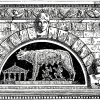


 Buy Now
Buy Now






